Hiring the right HR Generalist is crucial for maintaining a healthy workplace environment and ensuring smooth organizational operations. As an interviewer, having a well-prepared list of HR Generalist interview questions can help you identify top talent and make informed hiring decisions.
This blog post provides a comprehensive collection of interview questions tailored for HR Generalist candidates at various experience levels. We cover basic questions, junior-level inquiries, policy-related questions, employee relations scenarios, situational questions, and behavioral assessments.
By using these questions, you can effectively evaluate candidates' skills, knowledge, and cultural fit for your organization. Consider complementing your interview process with pre-employment assessments to gain a more holistic view of candidates' capabilities.
Table of contents
10 basic HR Generalist interview questions and answers to assess candidates
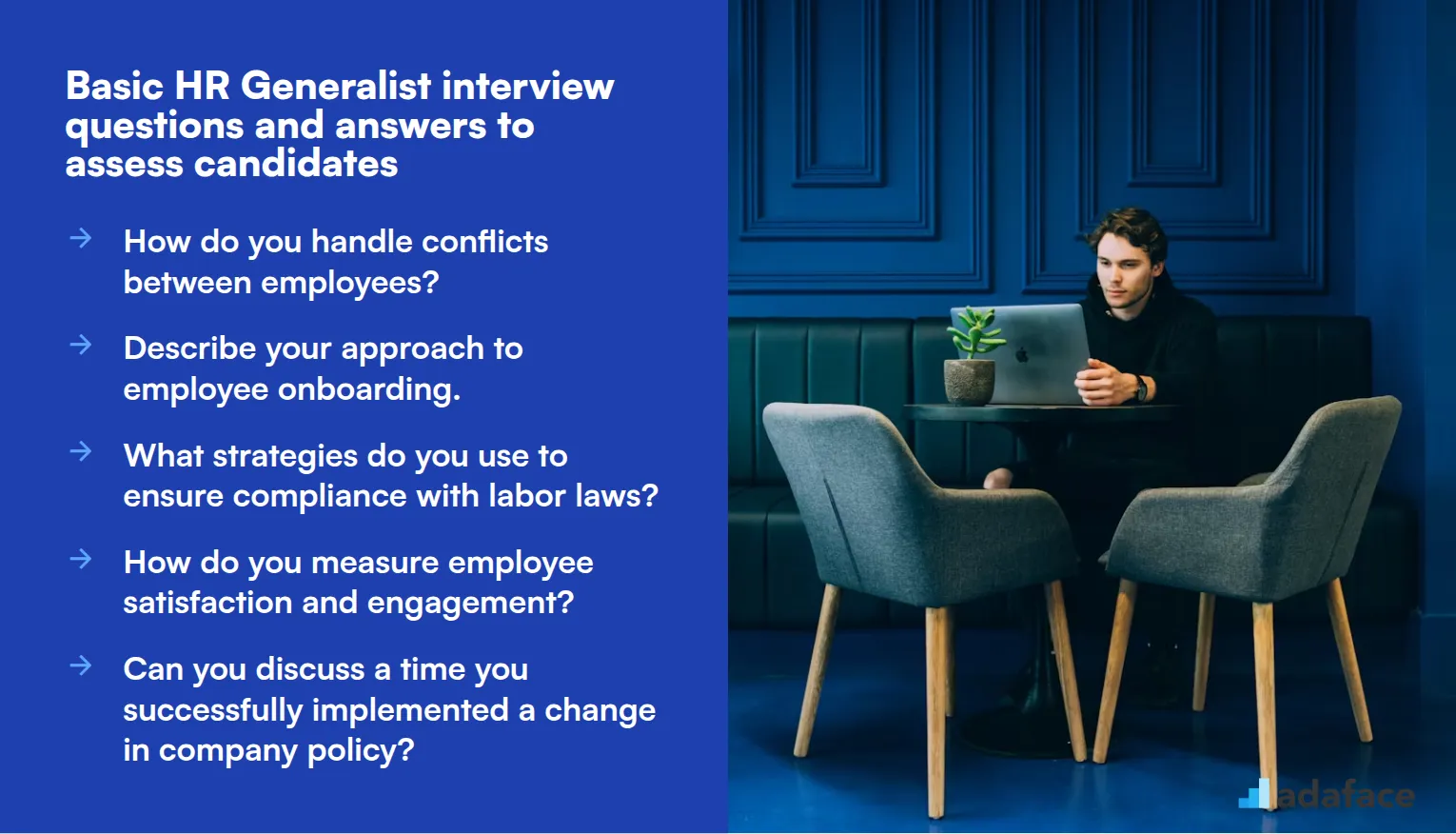
Interviewing HR generalists can feel like walking a tightrope, balancing between human touch and business acumen. This list of questions is your trusty net, designed to help you assess candidates on their fundamental knowledge and skills. Use these questions to gauge whether they have what it takes to keep the human in human resources while driving organizational success.
1. How do you handle conflicts between employees?
Handling conflicts requires a delicate balance of empathy and assertiveness. An HR generalist should first listen to each party’s perspective without taking sides, ensuring everyone feels heard. After gathering all relevant information, they should facilitate a conversation between the parties to reach a mutually agreeable solution.
An ideal candidate will emphasize the importance of maintaining a neutral stance and fostering open communication. Look for candidates who can demonstrate past experiences where their conflict resolution strategies led to positive outcomes.
2. Describe your approach to employee onboarding.
Effective onboarding is like setting the stage for a new employee's success. It involves more than just paperwork; it’s about making them feel welcome and equipped. A comprehensive orientation program, coupled with regular check-ins, helps new hires integrate smoothly into the company culture.
Candidates should focus on how they customize onboarding experiences to match the company’s culture and values, perhaps referencing strategies from the HR generalist job description.
3. What strategies do you use to ensure compliance with labor laws?
Staying compliant with labor laws is crucial for avoiding legal issues and maintaining trust. Regular training sessions for employees and management help keep everyone informed. Additionally, conducting regular audits and updating policies ensures ongoing compliance.
Look for candidates who can articulate their understanding of specific laws relevant to your industry and who demonstrate a proactive approach to keeping up with legislative changes.
4. How do you measure employee satisfaction and engagement?
Employee satisfaction can be gauged through various methods such as surveys, one-on-one meetings, and feedback sessions. Analyzing this data helps identify trends and areas for improvement, which can be addressed through targeted initiatives.
Candidates should provide examples of how they've used feedback to improve workplace culture and engagement. Ideal responses will include tangible results from past initiatives.
5. Can you discuss a time you successfully implemented a change in company policy?
Implementing change requires clear communication and buy-in from all stakeholders. It starts with identifying the need for change, followed by developing a clear plan and engaging employees throughout the process to ensure smooth adoption.
Strong answers will highlight the candidate’s ability to manage resistance and communicate effectively, showcasing their skills in leading successful transformations.
6. What role do you think technology plays in HR?
Technology is a game-changer in HR, streamlining processes like recruitment, payroll, and performance management. It allows for more efficient data management and enhances the employee experience through self-service portals.
A promising candidate will discuss specific technologies they’ve used and how these have positively impacted their HR functions, demonstrating a forward-thinking approach.
7. How do you handle confidential information?
Handling confidential information is about trust and integrity. It involves securing sensitive data and ensuring it is only accessible to those who need it. Regular training on data privacy policies is crucial.
The best responses will emphasize the candidate’s commitment to confidentiality and describe protocols they have implemented to safeguard information.
8. What is your approach to performance management?
Performance management should be a continuous process, not just a yearly review. It involves setting clear goals, providing regular feedback, and recognizing achievements. This approach fosters a culture of growth and improvement.
Candidates should share examples of how their strategies have led to improved performance, highlighting their ability to motivate and develop talent.
9. How do you support diversity and inclusion in the workplace?
Supporting diversity and inclusion requires intentional efforts, such as implementing unbiased recruitment practices and providing diversity training. Creating an inclusive environment where everyone feels valued leads to a more dynamic and innovative workforce.
Look for candidates who can share specific initiatives they’ve led and the positive impacts these had on the company culture.
10. Describe a successful recruitment strategy you have implemented.
A successful recruitment strategy aligns with the company’s goals and culture. It involves identifying the right channels to reach potential candidates and ensuring a smooth, engaging candidate experience. Metrics should be used to continuously refine the process.
An ideal candidate will discuss how their strategy led to successful hires and improved time-to-fill metrics, indicating effectiveness in their approach.
20 HR Generalist interview questions to ask junior HR Generalists
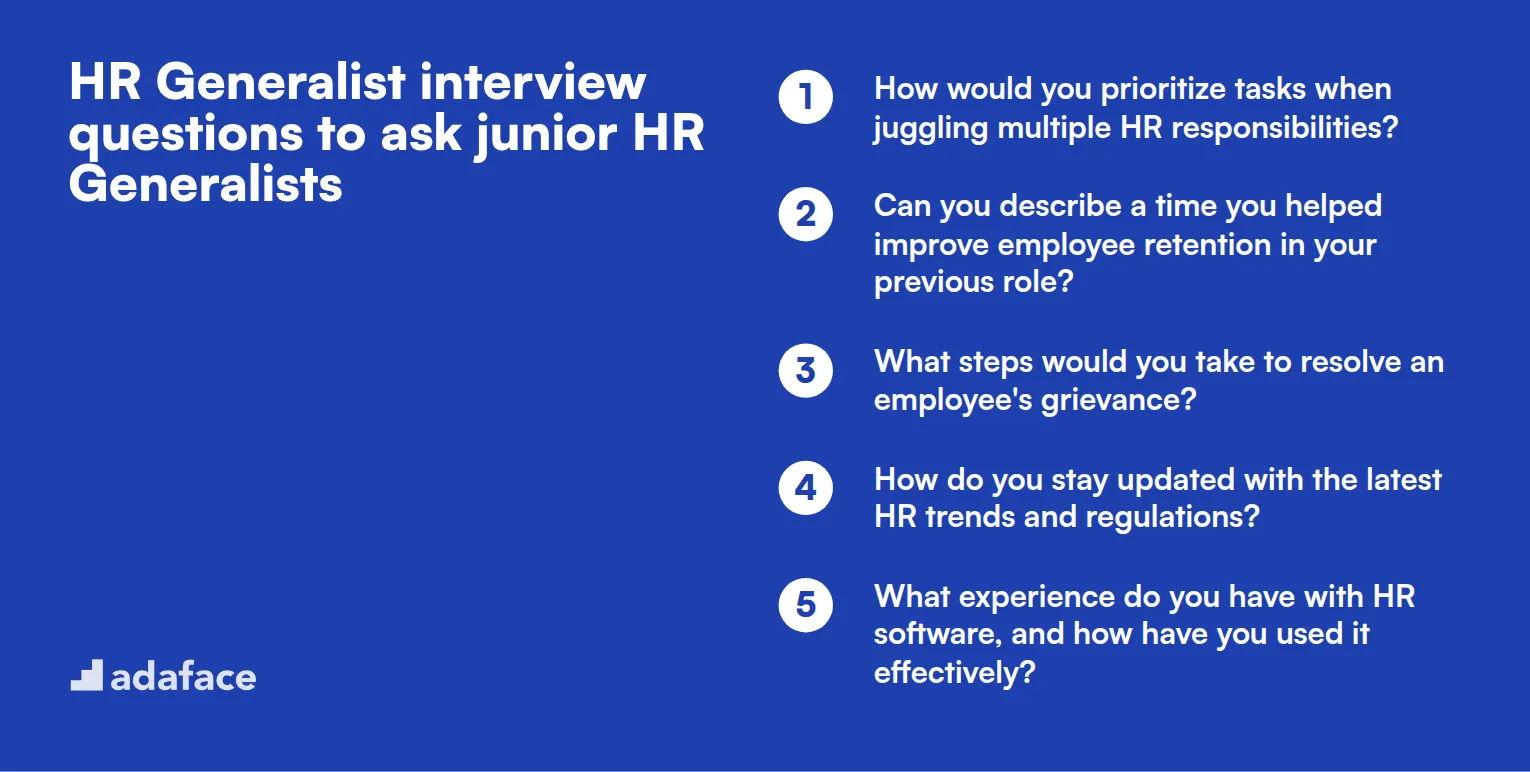
When interviewing junior HR Generalists, it's crucial to evaluate their understanding and readiness for the diverse challenges they'll face. This question list provides targeted queries to help you assess their problem-solving abilities, communication skills, and overall HR acumen.
- How would you prioritize tasks when juggling multiple HR responsibilities?
- Can you describe a time you helped improve employee retention in your previous role?
- What steps would you take to resolve an employee's grievance?
- How do you stay updated with the latest HR trends and regulations?
- What experience do you have with HR software, and how have you used it effectively?
- How would you assist a manager struggling with team dynamics?
- What is your approach to conducting exit interviews?
- How do you ensure new employees integrate well into the company culture?
- Can you provide an example of how you've dealt with an underperforming employee?
- What techniques do you use to conduct effective interviews?
- How would you handle a situation where an employee reports feeling harassed?
- What are your strategies for developing and maintaining team morale?
- How do you approach creating a positive employer brand?
- Describe your method for assessing the training needs of employees.
- What actions would you take if you noticed a breach in company policy?
- How do you ensure transparent communication between management and employees?
- Can you explain your process for handling payroll discrepancies?
- What measures do you take to support employee career development?
- How do you track and report on HR metrics?
- Describe a situation where you had to negotiate between different stakeholders.
8 HR Generalist interview questions and answers related to HR policies
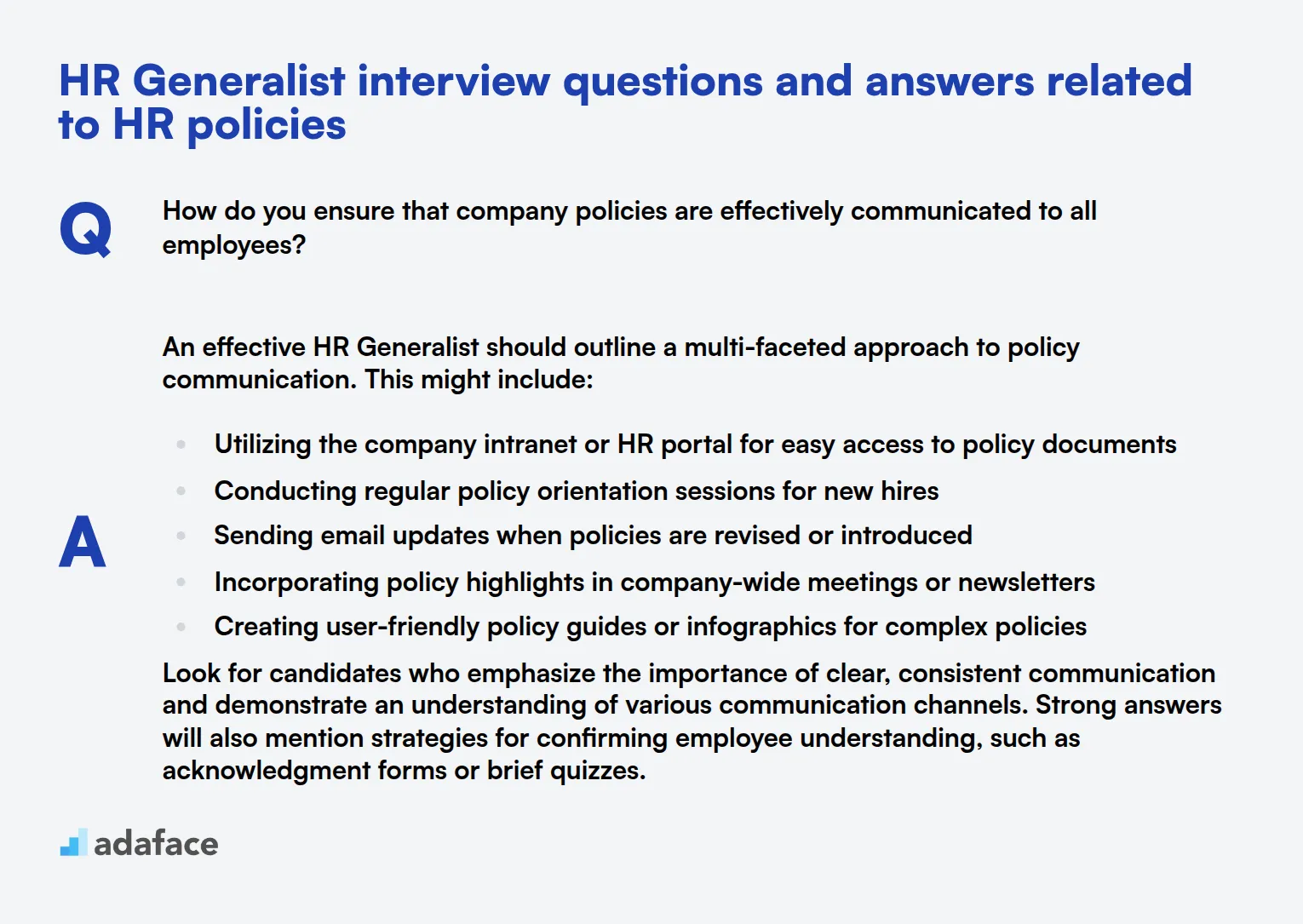
When interviewing for an HR Generalist position, it's crucial to assess the candidate's understanding of HR policies. These questions will help you gauge their knowledge and approach to policy implementation, ensuring you find someone who can effectively manage your organization's HR framework. Use this list to delve into the candidate's experience and problem-solving skills in policy-related scenarios.
1. How do you ensure that company policies are effectively communicated to all employees?
An effective HR Generalist should outline a multi-faceted approach to policy communication. This might include:
- Utilizing the company intranet or HR portal for easy access to policy documents
- Conducting regular policy orientation sessions for new hires
- Sending email updates when policies are revised or introduced
- Incorporating policy highlights in company-wide meetings or newsletters
- Creating user-friendly policy guides or infographics for complex policies
Look for candidates who emphasize the importance of clear, consistent communication and demonstrate an understanding of various communication channels. Strong answers will also mention strategies for confirming employee understanding, such as acknowledgment forms or brief quizzes.
2. Describe a situation where you had to revise an existing HR policy. What was your approach?
A competent candidate should describe a systematic approach to policy revision, such as:
- Identifying the need for revision (e.g., legal changes, employee feedback, operational issues)
- Researching best practices and legal requirements
- Drafting the revised policy
- Consulting with relevant stakeholders (management, legal team, affected departments)
- Incorporating feedback and finalizing the policy
- Planning and executing a communication strategy for the revised policy
- Monitoring the implementation and gathering feedback
Pay attention to how the candidate balances various stakeholder needs and ensures compliance while maintaining practicality. Look for mentions of change management techniques and methods to gauge the policy's effectiveness post-implementation.
3. How do you handle a situation where an employee repeatedly violates a company policy?
A strong response should outline a progressive disciplinary approach:
- Document each instance of policy violation
- Have a private conversation with the employee to understand the reasons behind the violations
- Provide clear explanations of the policy and its importance
- Issue verbal warnings, followed by written warnings if the behavior continues
- Implement a performance improvement plan if necessary
- Consider final written warnings or termination for continued non-compliance
Look for candidates who emphasize the importance of fairness, consistency, and documentation throughout the process. They should also mention the need to review the policy itself to ensure it's clear and reasonable, and consider if there are any underlying issues causing widespread non-compliance.
4. What steps would you take to create a new HR policy from scratch?
An experienced HR Generalist should describe a comprehensive process:
- Identify the need for the new policy (e.g., addressing a gap, legal requirement, organizational change)
- Research industry best practices and legal requirements
- Draft the policy, ensuring clarity and alignment with company culture
- Consult with relevant stakeholders (management, legal team, affected departments)
- Revise based on feedback and finalize the policy
- Develop an implementation plan, including communication strategy and training if needed
- Roll out the policy and monitor its effectiveness
Pay attention to how the candidate approaches policy creation with a balance of compliance, practicality, and organizational fit. Look for mentions of involving employees in the process and considering potential impacts on different departments or roles.
5. How do you stay updated on changes in employment laws and regulations that might affect company policies?
A proactive HR Generalist should mention multiple sources and methods:
- Subscribing to HR and legal publications or newsletters
- Attending industry conferences and webinars
- Participating in professional HR associations
- Following reputable HR blogs and social media accounts
- Regularly consulting with employment law attorneys
- Setting up Google alerts for relevant topics
- Participating in HR forums or discussion groups
Look for candidates who demonstrate a commitment to continuous learning and staying ahead of regulatory changes. Strong answers will also mention how they translate this knowledge into actionable steps, such as policy reviews or updates, and how they disseminate important information to relevant stakeholders in the organization.
6. How would you approach implementing a controversial new policy, such as stricter attendance rules?
A thoughtful response should include the following steps:
- Understand the reasons behind the new policy and its potential benefits
- Gather input from various departments to anticipate potential issues
- Develop a clear communication plan explaining the rationale and addressing concerns
- Consider a phased implementation or pilot program
- Provide training or information sessions for managers and employees
- Establish a feedback mechanism for employees to voice concerns
- Monitor the policy's impact and be prepared to make adjustments if necessary
Look for candidates who emphasize the importance of transparency, empathy, and open communication. They should demonstrate an understanding of change management principles and the ability to balance organizational needs with employee concerns.
12 HR Generalist questions related to employee relations
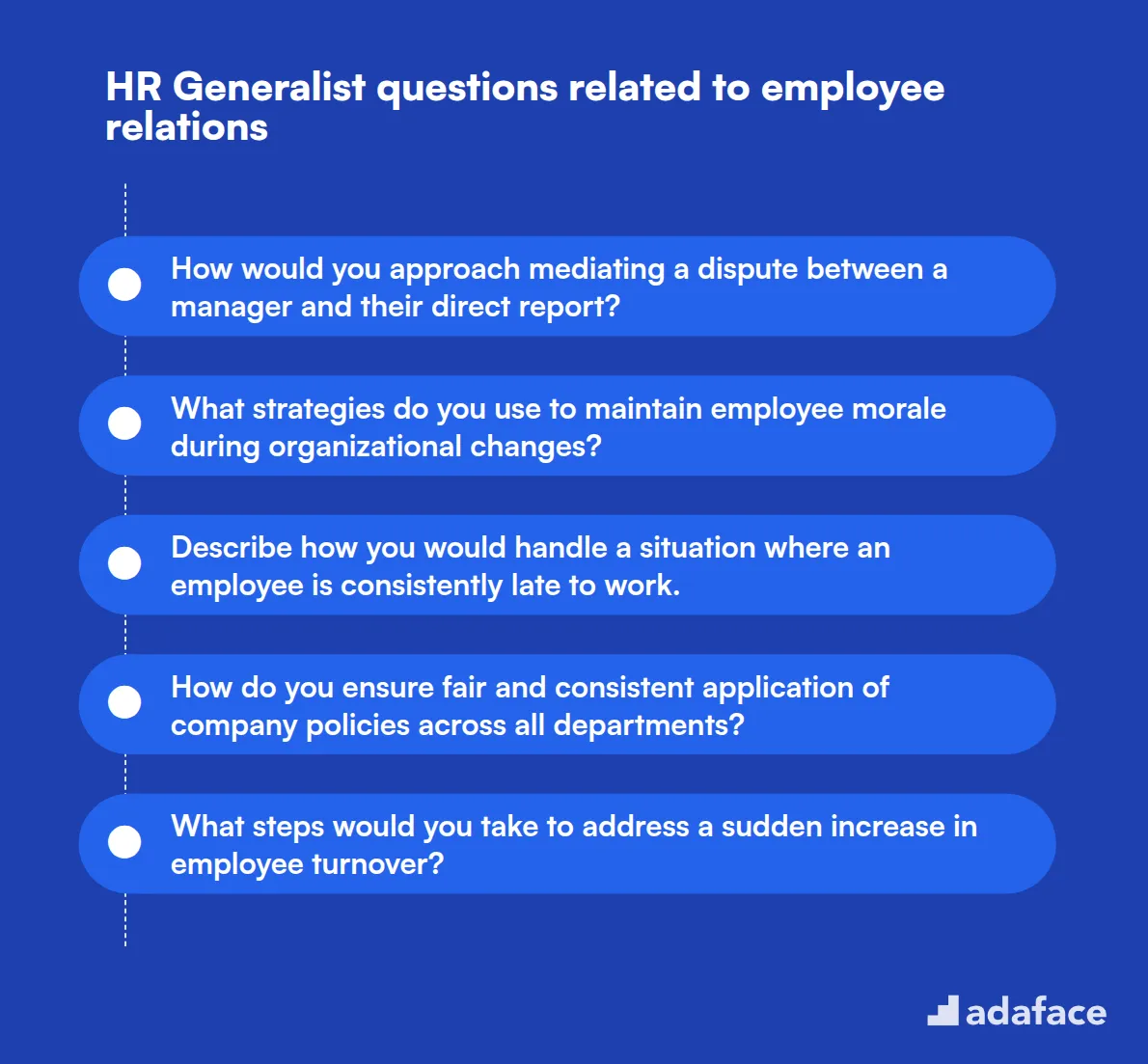
To assess a candidate's ability to handle employee relations, use these 12 HR Generalist interview questions. These questions will help you evaluate the applicant's approach to maintaining a positive work environment, resolving conflicts, and fostering strong relationships between management and staff.
- How would you approach mediating a dispute between a manager and their direct report?
- What strategies do you use to maintain employee morale during organizational changes?
- Describe how you would handle a situation where an employee is consistently late to work.
- How do you ensure fair and consistent application of company policies across all departments?
- What steps would you take to address a sudden increase in employee turnover?
- How do you approach giving constructive feedback to employees?
- Describe your process for conducting a workplace investigation.
- How would you handle a situation where an employee refuses to work with a colleague?
- What strategies do you use to promote work-life balance in the organization?
- How do you address concerns about favoritism in the workplace?
- Describe your approach to managing employee expectations during a company restructure.
- How would you handle a situation where an employee is struggling with personal issues that affect their work performance?
14 situational HR Generalist interview questions for hiring top HR Generalists
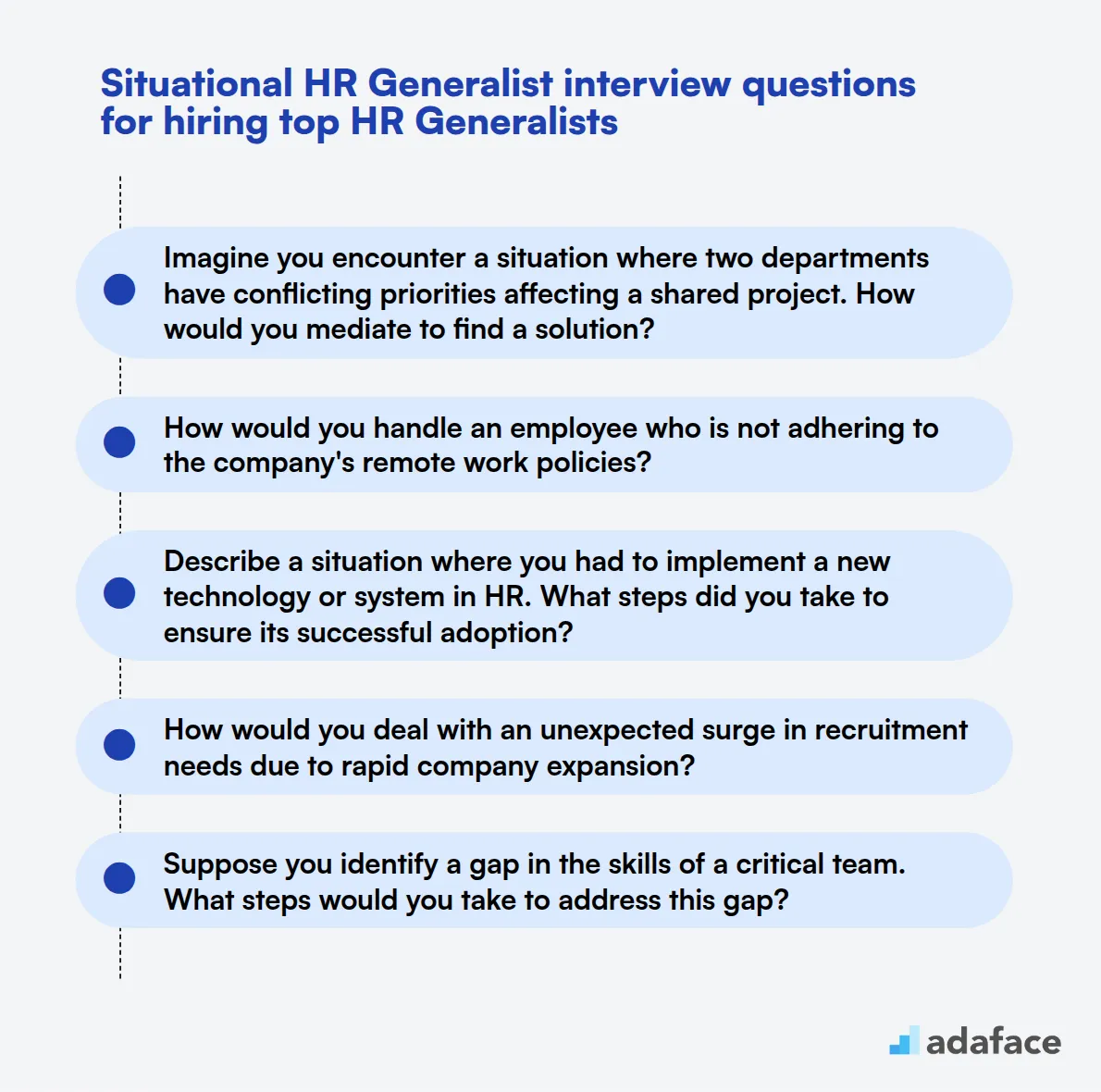
To ensure you hire top HR Generalists, it's essential to ask the right situational questions during interviews. These questions help assess candidates' abilities to handle real-world scenarios effectively and determine if they have the skills required for HR Generalist roles. Use this list as a guide to uncover how candidates might perform in your specific organizational context.
- Imagine you encounter a situation where two departments have conflicting priorities affecting a shared project. How would you mediate to find a solution?
- How would you handle an employee who is not adhering to the company's remote work policies?
- Describe a situation where you had to implement a new technology or system in HR. What steps did you take to ensure its successful adoption?
- How would you deal with an unexpected surge in recruitment needs due to rapid company expansion?
- Suppose you identify a gap in the skills of a critical team. What steps would you take to address this gap?
- If an employee approaches you with concerns about their career progression, how would you assist them?
- How would you handle a situation where a new hire is not meeting the job expectations within the probation period?
- Describe how you would approach creating a succession plan for a key leadership position.
- Imagine a scenario where you need to implement a company-wide training program. How would you ensure its effectiveness?
- How would you approach resolving a situation where an employee feels they are being unfairly compensated?
- If you notice a trend of increased absenteeism in a specific department, how would you address this issue?
- Describe a time when you had to communicate a difficult decision to the workforce. How did you ensure transparency and understanding?
- How would you prioritize and manage an unexpected high volume of employee grievances?
- Suppose you have to plan a major company event with tight deadlines. What strategies would you use to ensure its success?
9 behavioral HR Generalist interview questions and answers
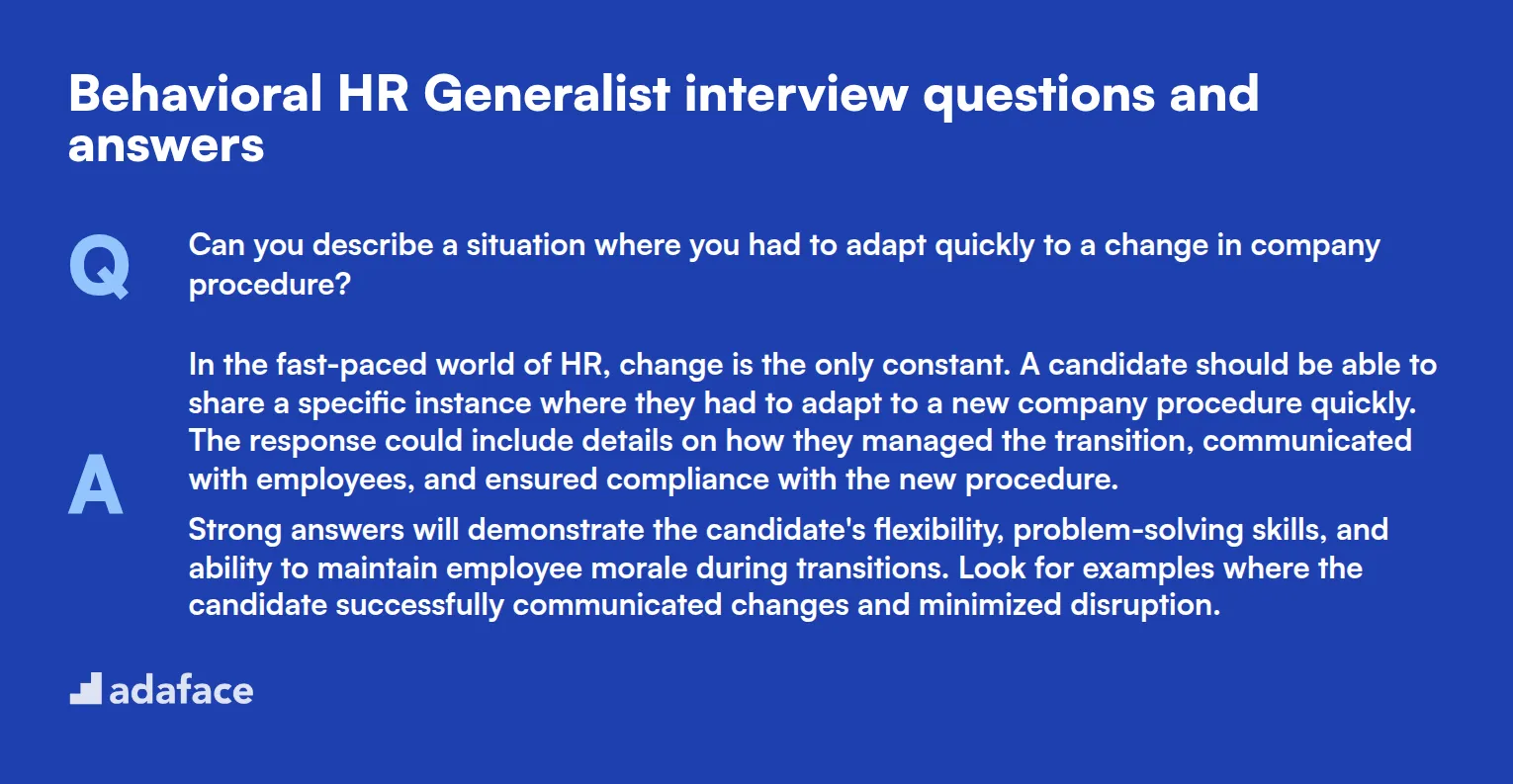
Use this list of behavioral HR Generalist interview questions to find the right fit for your team. These questions will help you gauge not only the candidate's skills but also their ability to handle real-world HR scenarios with finesse.
1. Can you describe a situation where you had to adapt quickly to a change in company procedure?
In the fast-paced world of HR, change is the only constant. A candidate should be able to share a specific instance where they had to adapt to a new company procedure quickly. The response could include details on how they managed the transition, communicated with employees, and ensured compliance with the new procedure.
Strong answers will demonstrate the candidate's flexibility, problem-solving skills, and ability to maintain employee morale during transitions. Look for examples where the candidate successfully communicated changes and minimized disruption.
2. How do you handle a situation where you have to deliver bad news to an employee?
Delivering bad news is never easy, but it's a crucial part of HR. A candidate should explain their approach to such situations, which might include being empathetic, clear, and direct while ensuring that the conversation remains professional.
Candidates should highlight the importance of preparing for the conversation by gathering all necessary information and being ready to offer support or alternatives if possible. Look for a candidate who shows both compassion and professionalism, indicating strong emotional intelligence.
3. Can you provide an example of a time you had to mediate a conflict between a manager and an employee?
HR often plays the role of a mediator to ensure a harmonious workplace. The candidate should discuss a specific conflict they have mediated, detailing their approach to understanding both sides, facilitating communication, and finding a resolution.
An ideal candidate will demonstrate active listening skills, neutrality, and the ability to find a win-win solution. Look for examples where the candidate maintained professionalism and successfully restored a positive working relationship.
4. Describe a time you had to implement a new HR initiative with limited resources.
Resourcefulness is a key trait for HR professionals. The candidate should describe an initiative they led or participated in, outlining the challenges they faced with limited resources and the creative solutions they employed to implement it successfully.
The candidate should demonstrate innovation, project management skills, and the ability to work within constraints. Look for examples that highlight their ability to leverage existing resources and gain buy-in from stakeholders.
5. How do you manage stress during peak HR periods like end-of-year reviews or open enrollment?
HR can be particularly stressful during peak periods. Candidates should discuss their strategies for managing stress, which might include time management, delegation, and self-care practices to maintain productivity and well-being.
Look for candidates who acknowledge the importance of maintaining a work-life balance and have effective strategies in place to manage high-stress situations without compromising on quality or efficiency.
6. Can you share an experience where you had to advocate for an unpopular HR decision?
Advocating for unpopular decisions is part of the HR role. Candidates should describe a specific instance where they had to support such a decision, detailing how they communicated with employees and addressed concerns.
A strong candidate will exhibit communication skills and resilience, demonstrating their ability to stand by necessary decisions while maintaining employee trust and morale. Look for examples where transparency and empathy played a key role.
7. What steps do you take to ensure that your team stays motivated?
Motivation is essential for a productive workplace. Candidates should describe their methods for keeping their team engaged, which may include regular check-ins, recognition programs, and opportunities for professional development.
Effective candidates will display an understanding of different motivational techniques and how they apply to various team dynamics. Look for examples of successful initiatives that resulted in improved team morale or productivity.
8. Describe a situation where you had to ensure compliance in a rapidly changing legal environment.
Staying compliant amidst changing laws is critical for HR. Candidates should share an experience where they had to quickly adapt to a new legal requirement, explaining the steps they took to ensure the company remained compliant.
Ideal candidates will demonstrate their ability to stay informed on legal changes, adjust company policies promptly, and effectively communicate these changes to employees. Look for their ability to anticipate potential impacts and mitigate risks.
9. How have you contributed to improving the overall employee experience in your previous roles?
Improving the employee experience is a crucial aspect of HR. Candidates should discuss specific initiatives they have led or contributed to, which could include wellness programs, engagement surveys, or career development workshops.
Look for candidates who can articulate the impact of their initiatives through measurable outcomes, such as increased employee satisfaction or reduced turnover. Their response should reflect a holistic understanding of the employee lifecycle.
Which HR Generalist skills should you evaluate during the interview phase?
While it's challenging to assess every aspect of a candidate in a single interview, focusing on core HR Generalist skills is crucial. These key competencies form the foundation of effective HR management and can provide valuable insights into a candidate's potential.
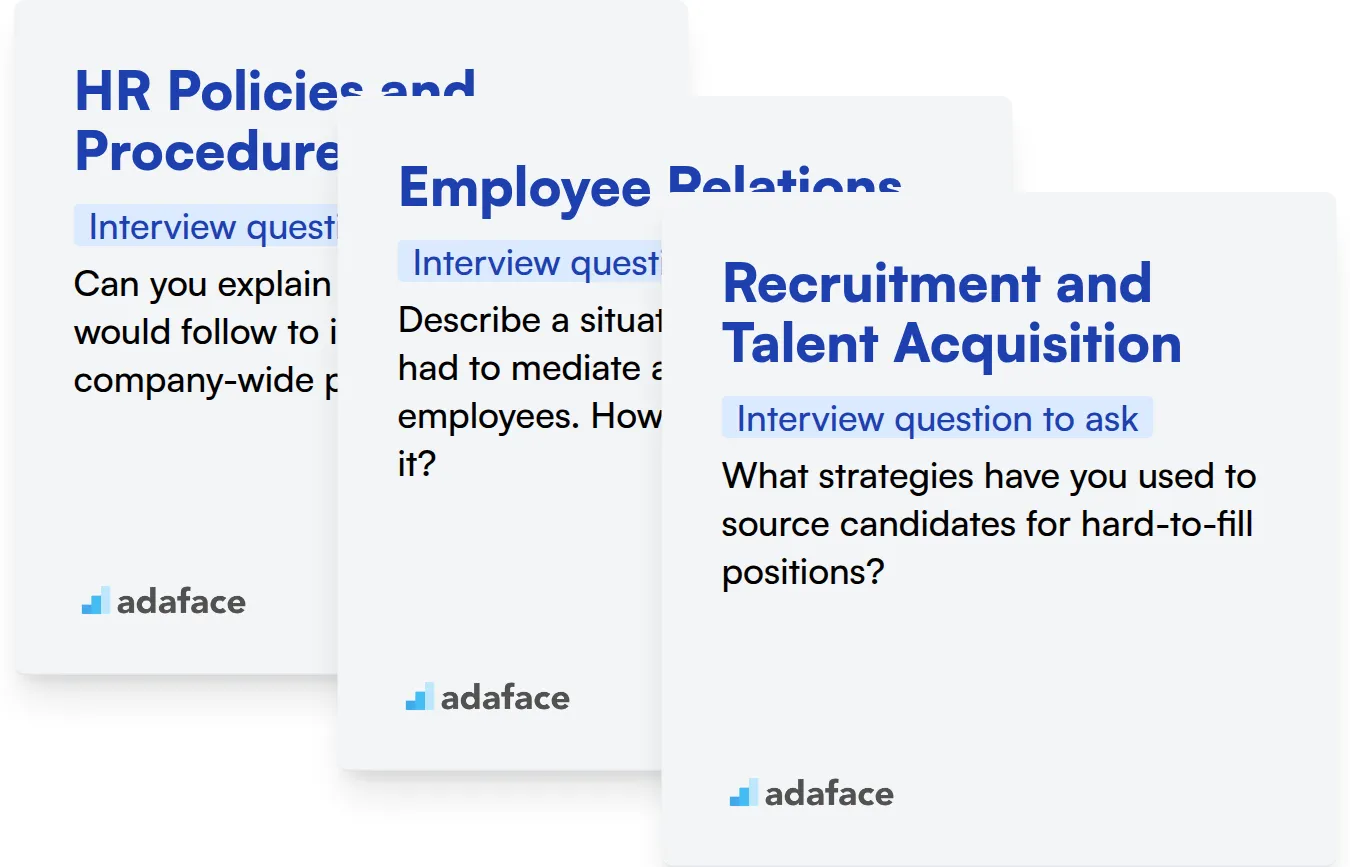
HR Policies and Procedures
Understanding HR policies and procedures is fundamental for an HR Generalist. It ensures compliance and consistent application of company rules.
Consider using an assessment test with relevant MCQs to evaluate candidates' knowledge of HR policies. The HR test from Adaface can be a helpful tool for this purpose.
To assess this skill during the interview, you can ask targeted questions about specific HR policies.
Can you explain the process you would follow to implement a new company-wide policy?
Look for answers that demonstrate a methodical approach, including steps like research, drafting, stakeholder consultation, communication, and implementation.
Employee Relations
Strong employee relations skills are essential for an HR Generalist to maintain a positive work environment and handle conflicts effectively.
During the interview, ask questions that reveal the candidate's approach to employee relations.
Describe a situation where you had to mediate a conflict between employees. How did you handle it?
Listen for responses that show empathy, impartiality, and problem-solving skills. The candidate should demonstrate the ability to listen to all parties and facilitate a resolution.
Recruitment and Talent Acquisition
Proficiency in recruitment and talent acquisition is crucial for an HR Generalist to attract and retain top talent for the organization.
You can use an assessment test with MCQs to evaluate candidates' knowledge of recruitment best practices. The Talent Acquisition test from Adaface covers this area comprehensively.
To assess this skill in the interview, ask about their experience with various recruitment methods.
What strategies have you used to source candidates for hard-to-fill positions?
Look for answers that demonstrate creativity, resourcefulness, and knowledge of modern recruitment techniques such as social media recruiting or employee referral programs.
Hire top talent with HR skills tests and the right interview questions
When hiring for HR Generalist roles, it's important to ensure candidates possess the necessary HR skills. Accurate assessment of these skills is key to finding the right fit for your team.
The most efficient way to evaluate these skills is through targeted skill tests. Consider utilizing our HR Generalist test to assess candidates effectively.
After administering the test, you can shortlist the best applicants and invite them for interviews. This process helps streamline your hiring and ensures you focus on qualified candidates.
To get started, visit our Adaface sign-up page and explore the available assessments. Simplify your hiring process and find the top HR talent for your organization.
HR Test
Download HR Generalist interview questions template in multiple formats
HR Generalist Interview Questions FAQs
An HR Generalist should have strong communication, problem-solving, organizational, and interpersonal skills. They should also be knowledgeable about HR policies, recruitment, employee relations, and labor laws.
To prepare, review common HR practices, brush up on labor laws, practice answering behavioral questions, and prepare examples of your past experiences in HR-related situations.
Common questions include those about HR policies, employee relations, conflict resolution, recruitment processes, and how to handle specific HR scenarios.
Use a combination of behavioral, situational, and knowledge-based questions. Also, consider using HR skills tests to evaluate their practical abilities.

40 min skill tests.
No trick questions.
Accurate shortlisting.
We make it easy for you to find the best candidates in your pipeline with a 40 min skills test.
Try for freeRelated posts
Free resources




